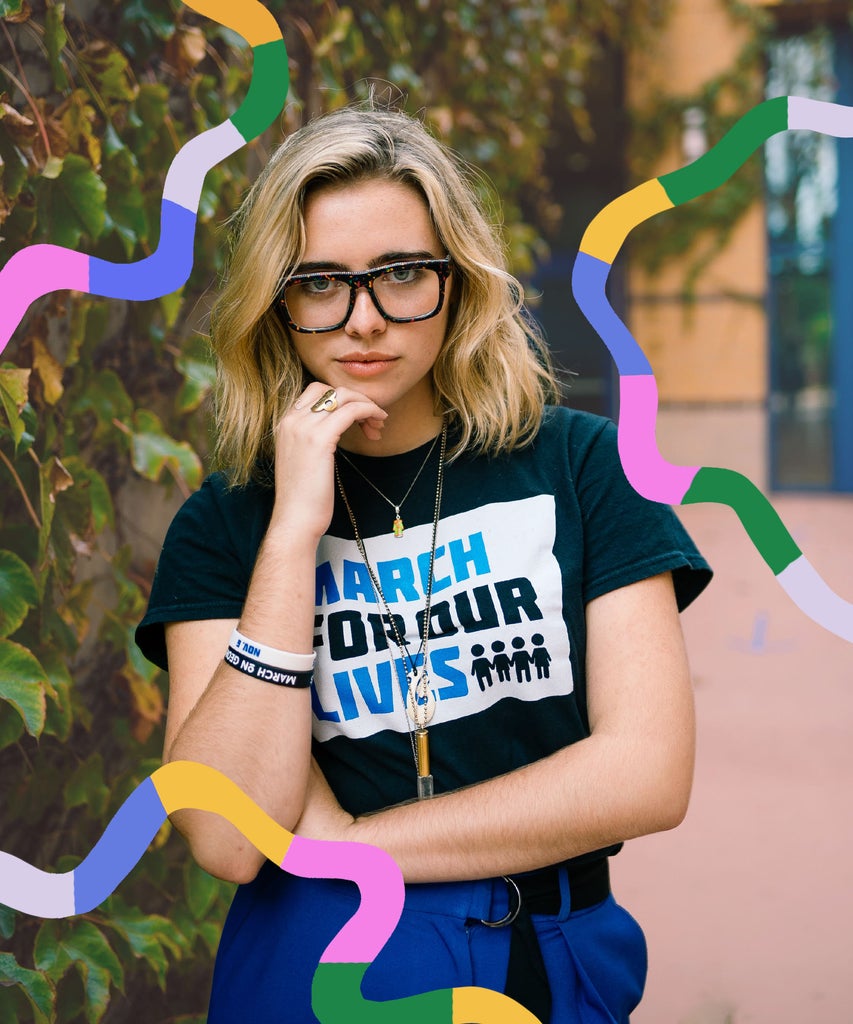
Refinery29 is partnering with Girls Who Code for the #MarchForSisterhood on International Day of the Girl. This is the first-ever all-digital global march. Come back each day this week to learn about why different young women are participating, and join us as we #MarchForSisterhood on any of your social media channels this Friday, October 11, 2019.
My life was irreparably changed on February 14th, 2018. That day, I made a forced passage from simple student to an activist on the national scale. That day, a gunman stole 17 lives from my classmates and so much more. But that day also began the rest of my life, known as the March For Our Lives. Fighting for peace, for youth, for our lives — it’s been the most insane and incredible experience of my life. But my fight did not begin that fateful Valentine’s Day. No, this is a fight I’d known for much longer. Something primal. Something shared by so many others. The fight for sisterhood.
Sisterhood, oppression, and equality were terms I first learned in high school. Sneers of “feminazi” and “SJWs” had floated around my campus, but I chose early on to take the plunge into social justice. Websites like Tumblr and Twitter radicalized me, a reblog seemingly turned an act of protest. In hindsight, much of what I learned was juvenile and exclusionary, but it was still the starting point for a lifetime of learning. I would take my knowledge to confront my peers on passive racism, or lack of political engagement. I was, in my mind, an upstanding feminist, ready to take on the world. Then I was forced to actually take on the world.
Navigating the field of activism can be quite daunting, especially for anybody that’s not a straight cis white man. Even passively, people and platforms would ignore the voices of women, members of the LGBTQ community, and people of color. I watched as privilege shaped our national platform, and the discourse around the painful issues at hand. It became easy to see just how many perspectives were missing from these spaces that claimed to uphold themselves as the pinnacle of social justice.
Frequently, I would attend female-centered events and women’s summits, and find myself on a stage, speaking where it wasn’t quite my place. Sure, I’m a woman, and in some ways a survivor, but my privilege isn’t so easily ignored. There is a reason myself and my Parkland peers were given our platform, and it had a lot to do with the color of our skin. I tried at those summits and many other events to raise the microphone to groups so often ignored, to acknowledge my blind spots as much as possible. I couldn’t just preach intersectionality, I had to practice it.
That practice of intersectionality became a part of my informal education as I listened to stories of women all across the world with different backgrounds yet a collective pain. The societal pressures, the misogyny, the oppression — they were all a familiar facet of our daily lives. It was in those many months that I carved my niche as not just a gun violence prevention activist, but an activist for women and femmes everywhere. Every issue intertwined: class, gender, race, sexuality, disability, and more. It’s impossible to ignore. I just have an obligation to speak up about it.
So, as my work with the March for Our Lives continues, I continue to learn and grow. I know the power a platform like mine can hold, especially for every little girl looking for guidance. I want nothing more than to be the powerful role model a younger me wishes she had. For that younger me, for my sister, for every little girl, I bring my best self. I take to the realm of academia, pen in hand, to learn of feminist theory and social justice. I read and I write and I weaponize my words in the familiar fight. Now, I know more. I am more. I am ready to take on the world, the good and bad. I am ready to March for my sisters. For what is right. For our bodies, our minds, our spirits, our voices, ourselves. I march for me and I march for you. I march for the future. I march for sisterhood.
Delaney Tarr is a co-founder of the March For Our Lives and an advocate for equality, youth empowerment, and gun violence prevention. She is currently a sophomore studying journalism and women’s studies at the University of Georgia
Click HERE to read more.
You can publish this article on your website as long as you provide a link back to this page.

Be the first to comment